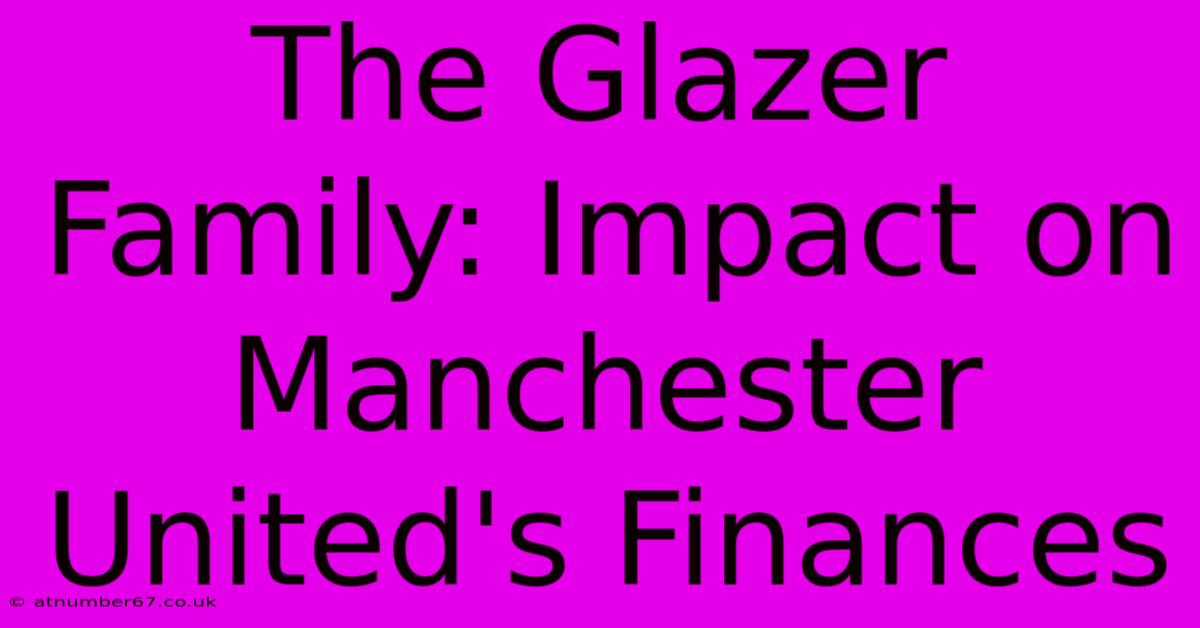The Glazer Family: Impact On Manchester United's Finances

Table of Contents
The Glazer Family: Impact on Manchester United's Finances
The Glazer family's ownership of Manchester United has been a contentious topic among fans for years. Their leveraged buyout in 2005, heavily reliant on debt, fundamentally altered the club's financial landscape. While the Glazers have overseen periods of on-field success, the financial implications of their ownership remain a subject of intense debate and scrutiny. This article will delve into the complex financial impact of the Glazer family on Manchester United, examining both the positives and, more significantly, the negatives.
The Leveraged Buyout: A Debt-Ridden Beginning
The 2005 takeover, financed through a substantial amount of debt, immediately saddled Manchester United with significant financial burdens. This debt, often referred to as "leveraged debt," placed immense pressure on the club's finances. The interest payments alone consumed a considerable portion of the club's revenue, limiting investment in infrastructure, player recruitment, and other vital areas. This initial debt load is often cited as the primary reason for fan discontent. The Glazers' business model, prioritising debt repayment over immediate reinvestment, became a major point of contention.
Consequences of the High Debt Levels:
- Reduced investment in the squad: The need to service the debt meant less money was available to strengthen the team through player transfers and improved wages, potentially hindering on-field performance.
- Deferred stadium improvements: Essential upgrades to Old Trafford, vital for maintaining revenue streams and improving the matchday experience, were delayed due to financial constraints.
- Increased financial risk: High levels of debt made the club more vulnerable to economic downturns and fluctuations in football's financial landscape.
Financial Performance Under Glazer Ownership: A Mixed Bag
While the leveraged buyout initially burdened the club with debt, Manchester United’s financial performance under the Glazers has shown some periods of growth, primarily fueled by massive commercial revenues. The club’s global brand and substantial fanbase have generated significant income through sponsorships, merchandise sales, and broadcasting rights. This revenue has helped to offset the impact of the initial debt and has allowed for some reinvestment in the team. However, critics argue that this revenue generation could have been even more impactful had the initial debt burden been significantly lower.
Positive Aspects of Glazer Ownership (Financially):
- Significant commercial revenue growth: Manchester United’s global reach has translated into impressive commercial success.
- Debt reduction (albeit slowly): Over time, the Glazers have gradually reduced the club's debt levels.
- Increased profitability (in some years): Despite the debt, the club has recorded profits in several financial years.
Ongoing Criticisms: Transparency and Fan Engagement
Despite positive financial indicators in certain areas, the Glazer family continues to face criticism regarding transparency and fan engagement. The lack of significant investment in the stadium and training facilities, relative to other top European clubs, fuels the perception of prioritizing debt repayment over long-term investment in the club’s future. Furthermore, the Glazers' limited engagement with the fanbase has led to sustained protests and a feeling of disconnect between the owners and the supporters.
Key Criticisms:
- Lack of transparency: Fans often complain about a lack of clear communication and financial reporting from the club's owners.
- Limited investment in infrastructure: Old Trafford’s aging infrastructure and the relative lack of investment compared to rivals remains a major point of concern.
- Strained relationship with fans: The Glazers' ownership has been marred by poor fan relations.
The Future of Manchester United's Finances Under the Glazers
The long-term financial prospects of Manchester United under the Glazer family remain uncertain. While the club’s commercial revenue is substantial, the question of how much of this revenue is reinvested in the club's future remains a key concern for fans. The Glazers’ commitment to long-term growth and investment in both the playing squad and stadium infrastructure will determine the club's future financial success and the level of fan support they enjoy. Ultimately, the legacy of the Glazer family’s ownership will be judged not just by the financial figures but also by the overall health and growth of the club and the relationship between the owners and the fans. A transparent and collaborative approach, prioritizing long-term investment and fan engagement, would be crucial in addressing existing concerns.

Thank you for visiting our website wich cover about The Glazer Family: Impact On Manchester United's Finances. We hope the information provided has been useful to you. Feel free to contact us if you have any questions or need further assistance. See you next time and dont miss to bookmark.
Featured Posts
-
The Formula For Success Flavio Briatores Net Worth
Apr 03, 2025
-
Meghan Markles Net Worth A Surprising Revelation
Apr 03, 2025
-
The Incredible Growth Of Lee Hyeris Net Worth
Apr 03, 2025
-
Piyush Guptas Net Worth A Study In Leadership
Apr 03, 2025
-
Is Amit Shahs Son Living Up To Expectations
Apr 03, 2025
